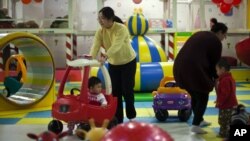SYDNEY —
Australian researchers say a new study measures how China's contentious one-child policy has affected the personality traits of generations of people. The team from Melbourne compared people who were born just before the policy was introduced in the late 1970s to those born after.
Researchers analyzed 421 adults in China. Fifty percent were born a few years before the one-child policy was instituted in 1979, while the other half were born a few years after.
Economic games and surveys were used to gauge the participants' behavior and their personality traits.
One test was called the “trust game.” A volunteer was given some money, which they could then give to an anonymous partner, who in turn would see the amount donated increased threefold.
Academics found that those born under the one-child policy would give notably less money to the partner. As recipients in the experiment, they also returned less to the person who originally gave them the money.
Other tests examined characteristics such as the willingness to take risks, and levels of competitiveness and pessimism.
Nisvan Erkal, an associate professor in the department of economics at the University of Melbourne, says the one-child policy has affected generations of Chinese. “What we find from the experiments we did, is that those people born under the one-child policy, and who are single children as a result of the policy, are significantly less trusting, less trustworthy, more risk-averse and less competitive,” he said.
Australian researchers were assisted by a survey company in China, which helped with the logistics of the two-year project. Erkal says her team did not encounter any difficulties in conducting research in China, adding that the Chinese government was “quite open” about discussions of its one-child policy.
Erkal says the effects of the population control policy that restricts families in urban areas to a single child could take years to reverse. “The policy has been in effect since 1979, so it has affected generations, and there are discussions right now to abolish the policy, and once it is abolished, then the effects will start to decline," explained Erkal. "But it is going to take time.”
The Melbourne team also stressed that the one-child policy was not strictly enforced across the country, so the results should not be applied to everyone in China.
Researchers analyzed 421 adults in China. Fifty percent were born a few years before the one-child policy was instituted in 1979, while the other half were born a few years after.
Economic games and surveys were used to gauge the participants' behavior and their personality traits.
One test was called the “trust game.” A volunteer was given some money, which they could then give to an anonymous partner, who in turn would see the amount donated increased threefold.
Academics found that those born under the one-child policy would give notably less money to the partner. As recipients in the experiment, they also returned less to the person who originally gave them the money.
Other tests examined characteristics such as the willingness to take risks, and levels of competitiveness and pessimism.
Nisvan Erkal, an associate professor in the department of economics at the University of Melbourne, says the one-child policy has affected generations of Chinese. “What we find from the experiments we did, is that those people born under the one-child policy, and who are single children as a result of the policy, are significantly less trusting, less trustworthy, more risk-averse and less competitive,” he said.
Australian researchers were assisted by a survey company in China, which helped with the logistics of the two-year project. Erkal says her team did not encounter any difficulties in conducting research in China, adding that the Chinese government was “quite open” about discussions of its one-child policy.
Erkal says the effects of the population control policy that restricts families in urban areas to a single child could take years to reverse. “The policy has been in effect since 1979, so it has affected generations, and there are discussions right now to abolish the policy, and once it is abolished, then the effects will start to decline," explained Erkal. "But it is going to take time.”
The Melbourne team also stressed that the one-child policy was not strictly enforced across the country, so the results should not be applied to everyone in China.




